Tag Archive: EBP
June 27, 2018
by Carole Zangari -
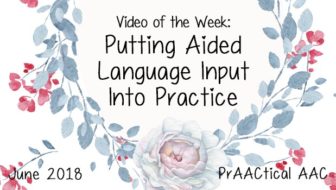
Research-supported strategies, such as aided language input, have much to offer beginning users of AAC. How can we get the team on board so that both families and professionals become knowledgeable about and proficient in utilizing these strategies? In today’s featured video, Melissa Hoy, an AT consultant with Saltillo, shares practical information on implementing aided language input across settings. You can download the handouts and resources for this presentation here. Enjoy! Direct Link to Video – https://www.youtube.com/watch?v=LULIMP4R6_k
Filed under: Video of the Week
Tagged With: aided language input, EBP
May 31, 2018
by Carole Zangari -
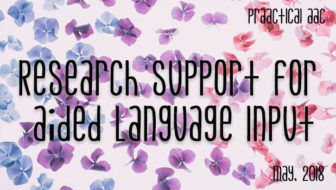
Aided language input, the practice of modeling AAC when speaking to those who are trying to learn AAC, is a pivotal intervention strategy. It has been shown to support comprehension and expression, and the development of early sentence forms. The evidence suggests it may also support the development of certain grammatical morphemes and verb combinations. You can learn more about the implementation of aided language input here. Here are some of the research studies that support the use of this evidence-based practice. Binger, C., & Light, J. (2007). The effect of aided AAC modeling on the expression of multi-symbol messages by preschoolers who use AAC. Augmentative and Alternative Communication, 23, 30–43. Binger, C., Maguire-Marshall, M., & Kent-Walsh, J. (2011). Using aided AAC models, recasts and contrastive targets to teach grammatical morphemes to children who use AAC. Journal of Speech, Language and Hearing Research, 54, 160–176. Dada, S., & Alant, E. (2009). The... [Read More...]
Filed under: Featured Posts, PrAACtical Thinking
Tagged With: aided language input, EBP, modeling, research
May 7, 2018
by Carole Zangari -
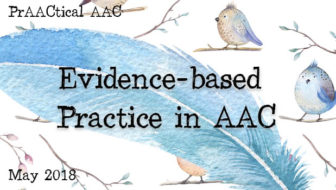
Dr. Jill Senner and Matthew Baud are staunch advocates for using research-based strategies and other evidence-based practices (EBP) in their AAC work. In today’s post. they share their thoughts on what EBP is, why it is important for AAC professionals, and how to incorporate it into our clinical and educational practices. :::::::::::::::::::::::::::::::::::::::::::::::::::::::::::::::::::::::::::::::::::::: Facts Matter: EBP in AAC Evidence-based practice (EBP) has been a buzz word in healthcare and education for almost two decades. However, “it has been well documented in many disciplines that major gaps exist between what is known as effective practices (i.e., theory and science) and what is actually done (i.e., policy and practice)” (Fixsen et al., 2005, p. 2). What is EBP, why is it important and how can we make sure we’re incorporating evidenced-based practices into our work with students and clients using AAC? Let’s take a look at answers to each of these questions below.... [Read More...]
Filed under: Featured Posts, PrAACtical Thinking
Tagged With: EBP, research
April 9, 2018
by Carole Zangari -
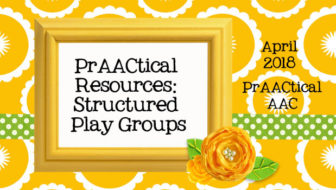
In today’s post, we visit an online module for helping children with autism learn to better interact with their peers using a structured play group methodology. Structured play groups are among the evidence-based practices that professionals can use to support young children with significant communication challenges. This online module was developed as a part of the Autism Focused Intervention Resources and Modules (AFIRM), a project of the National Professional Development Center on Autism Spectrum Disorders. Enjoy! If you enjoy this module and its accompanying resources, please consider supporting AFIRM.
Filed under: Featured Posts, PrAACtical Thinking
Tagged With: AFIRM, EBP, play, Structured Play Groups
May 11, 2017
by Carole Zangari -
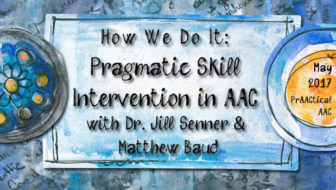
Better Hearing and Speech Month is in full swing and we are excited to see SLPs talking about tools and strategies for supporting people with AAC needs. Many individuals with AAC needs have difficulty using language in expected ways, particularly in social interactions. In this post, we welcome back guest authors Jill Senner and Matthew Baud to discuss ways in which they target pragmatic language in their clinical work. They have a prAACtical approach to this subject and are generous in sharing AAC resources, including vocabulary/pagesets for some popular AAC apps/SGDs. Enjoy! ::::::::::::::::::::::::::::::::::::::::::::::::::::::::::::::::::::: Chat with Me: Pragmatic Skill Intervention in AAC with Jill E Senner, PhD, CCC-SLP & Matthew R. Baud, MS, CCC-SLP Pragmatic skills, commonly referred to as social skills, play an important role in the successful integration of individuals with disabilities. People with disabilities need adequate social skills to live and be educated in the least restrictive environment, to be... [Read More...]
Filed under: Featured Posts, PrAACtical Thinking
Tagged With: EBP, intervention, pragmatics, Social Language
December 31, 2014
by Carole Zangari -

“A 21st century clinician who cannot critically read a study is as unprepared as one who cannot take blood pressure or examine the cardiovascular system.” What better way to end one year and usher in the new, than a reminder of the role of scientific study in our profession? In AAC, there isn’t as much research as we would like, but we sure do need to make it our business to evaluate and use the empirical evidence that we do have. P.S. We like Coldplay a little more now. ::::::::::::::::::::::::::::::::::::::::::::: Glasziou, P., Burls, A.,& Gilbert, R. (2008). Evidence based medicine and the medical curriculum: The search engine is now as essential as the stethoscope. The BMJ, 337, 704. Direct Link to Video: https://www.youtube.com/watch?v=QUW0Q8tXVUc
Filed under: PrAACtical Thinking
Tagged With: Coldplay, EBP, evidence, research
December 7, 2014
by Carole Zangari -
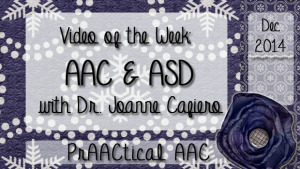
Do you get questions about effective AAC practices for individuals with autism? This video, featuring Dr. Joanne Cafiero, provides a helpful review of some of the issues. Many thanks to AssistiveWare for hosting this video.
Filed under: Video of the Week
Tagged With: ASD, EBP, Joanne Cafiero, research
June 13, 2014
by Carole Zangari -
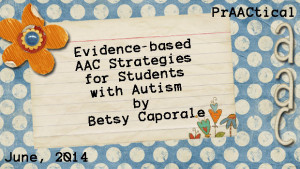
Autism Awareness and Acceptance Month may be over, but our interests in providing empirically-supported AAC services are long-lasting. In this post, we are pleased to be able to share the work of Betsy Caporale, an SLP with more than 20 years experience working in AAC, AT, and ASD. She has worked in a variety of settings including public schools, private hospitals and clinics. Currently, Betsy works at for the California Department of Education, Diagnostic Center in Northern California. Betsy has graciously agreed to share a presentation given a few months back at the California Speech Language and Hearing Association conference. You can download and view it here or in the AAC e-Toolbox.
Filed under: PrAACtical Thinking
Tagged With: ASD, Bety Corporale, EBP
June 26, 2013
by Carole Zangari -
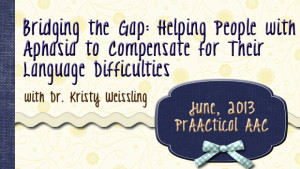
We’re wrapping up Aphasia Month with another fine post from Dr. Kristy Weissling. You can see her earlier posts here and here. In this post, Kristy shares her thoughts on how SLPs can use AAC supports to help individuals with aphasia compensate for their language difficulties. In 2010, my colleague, Carrie Prentice, and I talked about the role of both remediation and compensation in the speech rehabilitation programs of people with aphasia. At that time, we were trying to emphasize that at any particular time in the rehabilitation process, from acute care to outpatient rehabilitation, all possible alternatives should be balanced to create an individualized treatment program. Both restorative and compensatory mechanisms are available to therapist throughout this process. We proposed the work of Dixon, Garrett, and Backman (2008) to formulate a framework for discussing compensation. Six mechanisms of compensation were identified in their chapter on principles of compensation in... [Read More...]
Filed under: PrAACtical Thinking
Tagged With: aphasia, EBP, evidence, Kristy Weissling
June 24, 2013
by Carole Zangari -
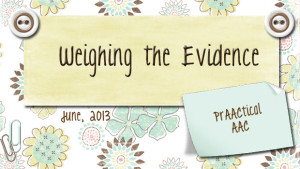
When people have significant communication difficulties that severely restrict their participation in daily life experiences, professionals and families alike sometimes find themselves attracted to the use of unproven methods. Although this usually comes from a good place, (i.e., the fervent desire to help someone), we have to be very careful in facing these decisions. Like you, we’ve heard comments like “Let’s try it. What’s the harm?” and they scare us. The harm can be difficult to quantify but is real nonetheless. Just talk to Gracie, whose mom cancelled therapies one summer and used the monies to take her swim with the dolphins. We’re not dolphin-haters, but there’s not much they can do for apraxia. We thought it was a good time to revisit this tutorial on differentiating science from pseudoscience. Many thanks to Dr. Caroline Bowen for hosting this article on her terrific website, Speech Language Therapy.com. Finn, P., Bothe,A.,... [Read More...]
Filed under: PrAACtical Thinking
Tagged With: best practices, EBP, evidence, pseudoscience, research, science









